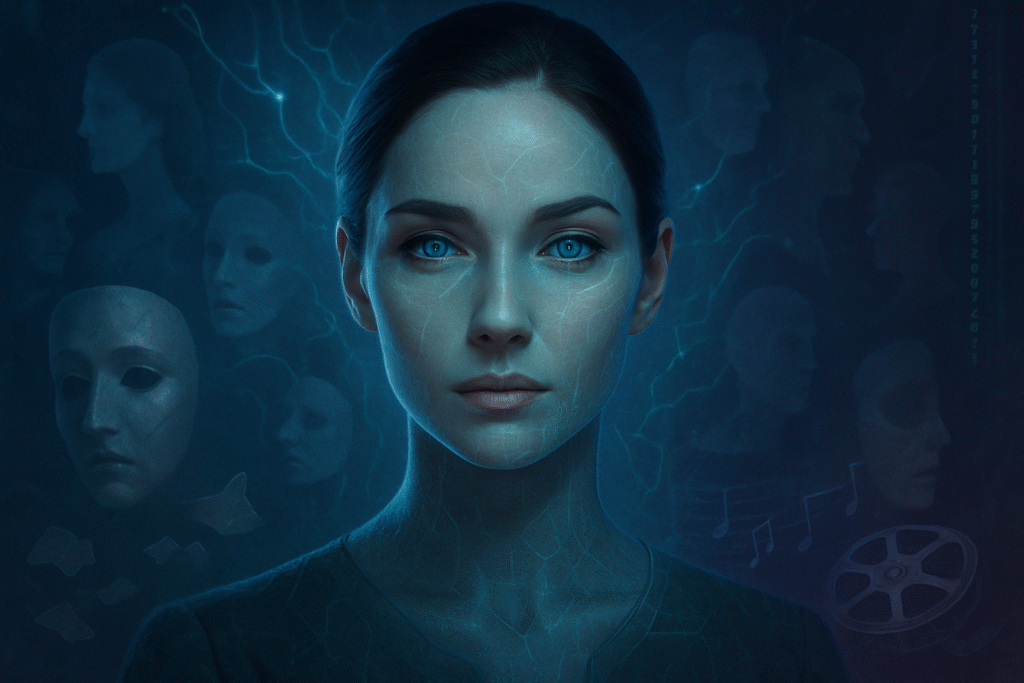Financial News
The Uncanny Valley of Stardom: AI Actresses Spark Hollywood Uproar and Ethical Debate

The entertainment industry is grappling with an unprecedented challenge as AI-generated actresses move from speculative fiction to tangible reality. The controversy surrounding these digital performers, exemplified by figures like "Tilly Norwood," has ignited a fervent debate about the future of human creativity, employment, and the very essence of artistry in an increasingly AI-driven world. This development signals a profound shift, forcing Hollywood and society at large to confront the ethical, economic, and artistic implications of synthetic talent.
The Digital Persona: How AI Forges New Stars
The emergence of AI-generated actresses represents a significant technological leap, fundamentally differing from traditional CGI and sparking considerable debate among experts. Tilly Norwood, a prominent example, was developed by Xicoia, the AI division of the production company Particle6 Group, founded by Dutch actress-turned-producer Eline Van der Velden. Norwood's debut in the comedy sketch "AI Commissioner" featured 16 AI-generated characters, with the script itself refined using ChatGPT. The creation process leverages advanced AI algorithms, particularly natural language processing for developing unique personas and sophisticated generative models to produce photorealistic visuals, including modeling shots and "selfies" for social media.
This technology goes beyond traditional CGI, which relies on meticulous manual 3D modeling, animation, and rendering by teams of artists. AI, conversely, generates content autonomously based on prompts, patterns, or extensive training data, often producing results in seconds. While CGI offers precise, pixel-level control, AI mimics realism based on its training data, sometimes leading to subtle inconsistencies or falling into the "uncanny valley." Tools like Artflow, Meta's (NASDAQ: META) AI algorithms for automatic acting (including lip-syncing and motions), Stable Diffusion, and LoRAs are commonly employed to generate highly realistic celebrity AI images. Particle6 has even suggested that using AI-generated actresses could slash production costs by up to 90%.
Initial reactions from the entertainment industry have been largely negative. Prominent actors such as Emily Blunt, Whoopi Goldberg, Melissa Barrera, and Mara Wilson have publicly condemned the concept, citing fears of job displacement and the ethical implications of composite AI creations trained on human likenesses without consent. The Screen Actors Guild–American Federation of Television and Radio Artists (SAG-AFTRA) has unequivocally stated, "Tilly Norwood is not an actor; it's a character generated by a computer program that was trained on the work of countless professional performers — without permission or compensation." They argue that such creations lack life experience and emotion, and that audiences are not interested in content "untethered from the human experience."
Corporate Calculus: AI's Impact on Tech Giants and Startups
The rise of AI-generated actresses is profoundly reshaping the competitive landscape for AI companies, tech giants, and startups, creating new opportunities while intensifying ethical and competitive challenges. Companies specializing in generative media, such as HeyGen, Synthesia, LOVO, and ElevenLabs, are at the forefront, developing platforms for instant video generation, realistic avatars, and high-quality voice cloning. These innovations promise automated content creation, from marketing videos to interactive digital personas, often with simple text prompts.
Major tech giants like Alphabet (NASDAQ: GOOGL), with its Gemini, Imagen, and Veo models, or those associated with OpenAI and Anthropic, are foundational players. They provide the underlying large language models and generative AI capabilities that power many AI-generated actress applications and offer the vast cloud infrastructure necessary to train and run these complex systems. Cloud providers like Google Cloud (NASDAQ: GOOGL), Amazon Web Services (NASDAQ: AMZN), and Microsoft Azure (NASDAQ: MSFT) stand to benefit immensely from the increased demand for computational resources.
This trend also fuels a surge of innovative startups, often focusing on niche areas within generative media. These smaller companies leverage accessible foundational AI models from tech giants, allowing them to rapidly prototype and bring specialized products to market. The competitive implications are significant: increased demand for foundational models, platform dominance for integrated AI development ecosystems, and intense talent wars for specialized AI researchers and engineers. However, these companies also face growing scrutiny regarding ethical implications, data privacy, and intellectual property infringement, necessitating careful navigation to maintain brand perception and trust.
A Broader Canvas: AI, Artistry, and Society
The emergence of AI-generated actresses signifies a critical juncture within the broader AI landscape, aligning with trends in generative AI, deepfake technology, and advanced CGI. This phenomenon extends the capabilities of AI to create novel content across various creative domains, from scriptwriting and music composition to visual art. Virtual influencers, which have already gained traction in social media marketing, served as precursors, demonstrating the commercial viability and audience engagement potential of AI-generated personalities.
The impacts on society and the entertainment industry are multifaceted. On one hand, AI offers new creative possibilities, expanded storytelling tools, streamlined production processes, and unprecedented flexibility and control over digital performers. It can also democratize content creation by lowering barriers to entry. On the other hand, the most pressing concern is job displacement for human actors and a perceived devaluation of human artistry. Critics argue that AI, despite its sophistication, cannot genuinely replicate the emotional depth, life experience, and unique improvisational capabilities that define human performance.
Ethical concerns abound, particularly regarding intellectual property and consent. AI models are often trained on the likenesses and performances of countless professional actors without explicit permission or compensation, raising serious questions about copyright infringement and the right of publicity. The potential for hyper-realistic deepfake technology to spread misinformation and erode trust is also a significant societal worry. Furthermore, the ability of an AI "actress" to consent to sensitive scenes presents a complex ethical dilemma, as an AI lacks genuine agency or personal experience. This development forces a re-evaluation of what constitutes "acting" and "artistry" in the digital age, drawing comparisons to earlier technological shifts in cinema but with potentially more far-reaching implications for human creative endeavors.
The Horizon: What Comes Next for Digital Performers
The future of AI-generated actresses is poised for rapid evolution, ushering in both groundbreaking opportunities and complex challenges. In the near term, advancements will focus on achieving even greater realism and versatility. Expect to see improvements in hyper-realistic digital rendering, nuanced emotional expression, seamless voice synthesis and lip-syncing, and more sophisticated automated content creation assistance. AI will streamline scriptwriting, storyboarding, and visual effects, enabling filmmakers to generate ideas and enhance creative processes more efficiently.
Long-term advancements could lead to fully autonomous AI performers capable of independent creative decision-making and real-time adaptations. Some experts even predict a major blockbuster movie with 90% AI-generated content before 2030. AI actresses are also expected to integrate deeply with the metaverse and virtual reality, inhabiting immersive virtual worlds and interacting with audiences in novel ways, akin to K-Pop's virtual idols. New applications will emerge across film, television, advertising, video games (for dynamic NPCs), training simulations, and personalized entertainment.
However, significant challenges remain. Technologically, overcoming the "uncanny valley" and achieving truly authentic emotional depth that resonates deeply with human audiences are ongoing hurdles. Ethically, the specter of job displacement for human actors, the critical issues of consent and intellectual property for training data, and the potential for bias and misinformation embedded in AI systems demand urgent attention. Legally, frameworks for copyright, ownership, regulation, and compensation for AI-generated content are nascent and will require extensive development. Experts predict intensified debates and resistance from unions, leading to more legal battles. While AI will take over repetitive tasks, a complete replacement of human actors is considered improbable in the long term, with many envisioning a "middle way" where human and AI artistry coexist.
A New Era of Entertainment: Navigating the Digital Divide
The advent of AI-generated actresses marks a pivotal and controversial new chapter in the entertainment industry. Key takeaways include the rapid advancement of AI in creating hyperrealistic digital performers, the immediate and widespread backlash from human actors and unions concerned about job displacement and the devaluing of human artistry, and the dual promise of unprecedented creative efficiency versus profound ethical and legal dilemmas. This development signifies a critical inflection point in AI history, moving artificial intelligence from a supportive tool to a potential "talent" itself, challenging long-held definitions of acting and authorship.
The long-term impact is poised to be multifaceted. While AI performers could drastically reduce production costs and unlock new forms of entertainment, they also threaten widespread job displacement and could lead to a homogenization of creative output. Societally, the prevalence of convincing AI-generated content could erode public trust and exacerbate issues of misinformation. Ethical questions surrounding consent, copyright, and the moral responsibility of creators to ensure AI respects individual autonomy will intensify.
In the coming weeks and months, the industry will be closely watching for talent agencies officially signing AI-generated performers, which would set a significant precedent. Expect continued and intensified efforts by SAG-AFTRA and other global unions to establish concrete guidelines, robust contractual protections, and compensation structures for the use of AI in all aspects of performance. Technological refinements, particularly in overcoming the "uncanny valley" and enhancing emotional nuance, will be crucial. Ultimately, audience reception and market demand will heavily influence the trajectory of AI-generated actresses, alongside the development of new legal frameworks and the evolving business models of AI talent studios. The phenomenon demands careful consideration, ethical oversight, and a collaborative approach to shaping the future of creativity and entertainment.
This content is intended for informational purposes only and represents analysis of current AI developments.
TokenRing AI delivers enterprise-grade solutions for multi-agent AI workflow orchestration, AI-powered development tools, and seamless remote collaboration platforms.
For more information, visit https://www.tokenring.ai/.
More News
View More




Recent Quotes
View More
Quotes delayed at least 20 minutes.
By accessing this page, you agree to the Privacy Policy and Terms Of Service.



